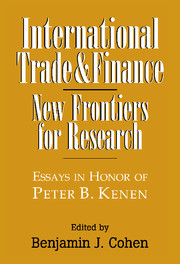1 - The practical theorist: Peter Kenen's contribution to international economics
Published online by Cambridge University Press: 11 September 2009
Summary
Academic economists can achieve distinction in many ways. Some become innovative theorists, who re-imagine the world and give us a new language to discuss how it works. Some become sage advisers to the powerful, shaping policies and institutions by the force of their intellect. Some become servants to the profession – great teachers, or those invaluable academic statesmen who edit journals and guide centers of research. And a few masochistic economists even become academic administrators – a job somebody once described as being like trying to herd cats.
The extraordinary thing about Peter Kenen's career is that he has filled all these roles, and filled them all so very well. The theorist who wrote “Nature, Capital, and Trade” and “The Theory of Optimum Currency Areas” was also a key member of the famed Bellagio Group, which brought together policy-minded academics and intellectually inclined policymakers to discuss international monetary institutions with a depth and cogency that have never been matched. It goes without saying that Kenen's combination of analytical force and real-world acumen has made him one of the most influential teachers of his generation. But not content with these accomplishments, he has also directed the International Finance Section, which under his leadership has maintained to this day a unique role as a center for and publisher of policy-relevant research in international economics.
- Type
- Chapter
- Information
- International Trade and FinanceNew Frontiers for Research, pp. 7 - 28Publisher: Cambridge University PressPrint publication year: 1997

